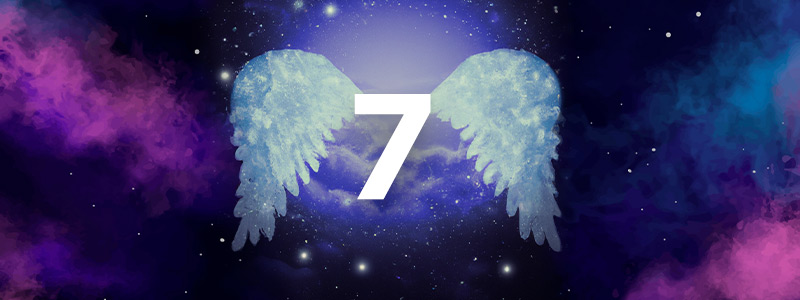History
The meaning of the number seven has had a long and rich history and is held in high regard in many cultures. In the Bible, God created the world in seven days and many other religious texts have seven important figures or concepts. Ancient cultures had seven gods, and the number seven was seen as a lucky number to some. This article will take a look at the history of the number seven and some of the importance it has been seen to have.
Ancient cultures
Throughout human history, number seven has held great importance in many ancient cultures and religions. In mathematics, the number is considered a prime number, meaning that it’s only divisible by itself and the number one.
In the Bible, the world was created in six days and God rested on the seventh — hence why many cultures consider seven a symbolic representation of completeness or perfection. The ancient Greeks valued seven as well; some say this is where our modern-day obsessions with lucky seven originate from.
Seven was also believed to be a magical number by many different civilizations such as the Babylonians and Egyptians. They developed very elaborate numerological systems based on this single number, which were used for mathematical calculations as well as for religious purposes such as predicting future events or providing guidance on divining luck.
The Hindus were also inspired by the power of seven when they developed their chakra system. This system devised positions for cosmic energy centers which corresponded to each of the planets gods in their belief systems; with each representing a distinct frequency or wavelength of light associated with physical bodies, emotions and spiritual development.
Overall, evidence suggests that humans have long been driven toward something greater than themselves—a unknown connection between life’s variables—a numerical foundation recognized throughout time both tangible and mystical — represented most significantly by the magical number seven.
Biblical references
The number 7 is a recurrent motif in the Judeo-Christian tradition and appears in several stories from the Bible. In the book of Genesis, God creates the universe in 6 days and rests on the 7th. The seventh day is regarded as holy – a sign of God’s eternal rest and a reminder to people to observe that same day with similar reverence.
The number 7 also shows up prominently during Jesus’s ministry: it often played an important role in his miracles, such as when he fed 5000 people with seven loaves of bread. He also selected seven apostles to carry out his mission: Peter, John, James, Andrew, Philip, Bartholomew and Thomas. These apostles would be instructed by Jesus to nurture their faith through a variety of prayers: some would recite psalms after meals while others expressed gratitude during church services.
In Revelation 8:1–6, an angel and seven trumpets appear before John — representing a series of days in which each judgement falls upon humanity with increasing severity. Both directly referenced numbers represent occasions for Christian reflection and contemplation—days for assessing where one stands on faith matters before making what may be life-altering decisions or committing to courses of action that align more closely with God’s will.
Numerology
The number 7 is a spiritual yet powerful number that can have many different meanings depending on the context. In numerology, the number 7 is considered to be lucky and associated with wisdom, knowledge, and spiritual enlightenment. It is also said to represent intelligence, creativity, and psychic abilities. Let’s look at what the number 7 means in terms of numerology.
Seven as a spiritual number
In numerology, the number seven carries with it both spiritual and practical meanings. It is believed to be a lucky number and many spiritual seekers use it to express their deep beliefs and desires. For these reasons, the number seven is often seen as a powerful symbol of faith and inner strength.
In terms of spiritual practice, the number seven has been said to represent peace, harmony, growth, luckiness and prosperity. People who are attempting to find deeper appreciation for life often look toward this symbol as motivation and support.
Seven also closely relates to other important symbolic numbers such as four (for grounding), five (for freedom) and nine (for completion). Much like colors in a rosary bear significance for Christians, so too does every digit in numerology have its own purpose within religion and quiet contemplation.
In terms of practical matters, seven can be useful when seeking help from loving spirits or divine beings. It is said that by repeating “7” three times in one breath you can invoke love from higher powers on both an emotional and physical level. Alternatively you may try some form of mantra with the number 7 repeated several times for protection against fear or negativity in your life. Used this way the ancient power of this spirit-charged number can influence positive change by manifesting our wishes into actionable reality. Contrary to popular belief other numbers such as four (thought clarity) or five (communication) may better fit individual circumstances depending on what kind of help we seek from beyond ourselves or unseen entities that respond best to unconditional love signals activated in particular ways through thought-filled word repetition such as chanting a numerical pattern expressed with feeling behind each sound produced purposefully with intent behind our words filled with faith in their power while they leave our lips
Seven as a lucky number
The number seven is considered lucky in various cultures across the world and appears in many religious texts. It’s a profoundly spiritual number in astrology, numerology and other belief systems.
In ancient history, people believed that the number seven held special power–in terms of natural cycles, it’s often cited as nature’s “perfect” number. In Christianity, the 7 (or sometimes 77) is indicative of completeness or holiness; most notably seen in the “seventh day of rest” during creation. Across diverse belief systems, this sacred number can also be found in numerals for deity and/or ascension, such as Chokmah (God) or Shiva (Hinduism).
In addition to its religious significance,seven has been linked with luck since ancient times and often appears on jewelry, clothing and tattoos. Could it be because seven deities in Greek mythology protected humanity with their unique talents? Could it be because there were seven wonders of the world according to many historians? Or perhaps it has something to do with seven representing a full circle – no matter which direction we start from -seven is always rendered complete at opposite ends–a sign that good luck will come around again?
No matter what reason works best for you–there’s much to be gained by honoring this special number! From an increased commitment to family values like compassion toward others and honor for one’s word to fast luck manifestation thanks to quick magnetism – people have felt bolstered when energy from this inter-connected symbol comes into play!
Astrology
The number 7 has a special significance in astrology and has been linked to spirituality, good luck and even perfection in many cultures. This number is associated with wealth, wisdom and the power of divine knowledge. It’s believed to be a highly spiritual number that can bring a person much closer to their higher self and to Universal energies. In this article, we’ll be exploring the astrological implications of the number 7.
Seven as a planet
In ancient times, the seven celestial objects known to the ancients as the planets of our solar system were believed to have a powerful influence on everyone’s fate. Astrology assigns seven planetary rulers to the signs of the zodiac and each has its own characteristics and traits that determine how they will affect people.
In astrological terms, we are talking about the seven heavenly bodies that are visible houses in astrology; namely Sun (Surya), Moon (Chandra), Mars (Mangala), Mercury (Budha), Jupiter (Guru or Brihaspati), Venus (Shukra) and Saturn (Shani). These seven primary planets play a key role in influencing our lives. In addition, there are three other inferior planets called Rahu, Ketu and Shool or Gulika that possess great power as per Indian astrological tradition.
Moreover there is also another planet mostly considered in Vedic Astrology today- Uranus which falls under higher elevations denoted as URJESA GRAHA. This modern seventh planet found during late 19th century is believed to have a strong correlation with shock experiences happening in person’s life depending on its placement along with other planets in a horoscope thereby becoming increasingly popular among astrologers .
Seven as an astrological sign
The number seven is a powerful number in astrology, seen as the perfection of the number 3 (the Trinity) combined with the number 4 (which symbolizes material existence). Seven has a special place in mythology and religion, representing balanced perfection and spiritual attainment. The planets beyond Saturn were only discovered centuries after astrology was already established, but it wasn’t until the twentieth century that seven became an acknowledged celestial body — revealing an almost mystical level of insight into the workings of subtle energies.
The discovery of Uranus in 1781 signalled a complete change in astrological philosophy. It also completed the pattern of seven planets or ‘lords’ which bear influence on this earth-bound reality — Sun (Sun), Moon (Lunar), Mercuries (communication), Venus (love affair), Mars (warrior success), Jupiter (karmic advancement) & Saturn (timelessness). Uranus changed the way we understand our universe and opened up the field for further exploration.
Seven as an astrological sign demonstrates how closely science, astronomy and humanity coincide, being constantly curious about forces shaping our world. It stands for perfect harmony between different realms; physical, mental, spiritual and transcendental universes carefully aligned to meshed clockwork allowing us to better embrace life awaiting us around every corner.
Symbolism
The number 7 holds great symbolism in many cultures, religions, and traditions. It is seen as a sign of luck, fortune, and completion. In Christianity, it is said to be the “perfect number,” as it symbolizes the completeness of God’s creation. In Hinduism, it is seen as a holy and magical number. In numerology, it represents spirituality, deep contemplation, and a sense of wholeness and peace. Whether it is a sign of luck, fortune, or completeness, the number 7 is a powerful symbol.
Seven as a symbol of luck
For centuries, the number seven has been widely viewed as a symbol of luck, success, and good fortune. In many cultures, seven is seen as a magical or spiritual number as it was thought to have special cosmic powers. It is believed to be the sum of three and four – the most significant sacred numbers in ancient mythology -which is why the number seven shows up in so many places throughout history.
In Christianity, the number seven represents perfection and completeness. From Genesis to Revelation in the Bible, the number itself holds special meaning because God creates and blesses things in multiples of seven. Furthermore, there are numerous stories about individuals who encounter a series of lucky events that occur in sets of seven such as Noah receiving special signs from God on how to build his ark – warning him to prepare for forty days and nights before the Great Flood would start.
Meanwhile, other practices including Hinduism, Judaism and Islam also recognize the power implicit within 7 – whether it be through stories from their religious texts or traditions passed down from generation to generation. In Native American culture for example, some tribes would traditionally use feathers with a fan design featuring 7 points equated with life-changing ceremonies centered around granting wishes or prayers for good fortune; while others such as European pagans valued number 7 as a representation of primal energies associated with love and rebirth during springtime rituals like Beltane or Ostara celebrations.
7 has appeared all over Global folklore including traditional Irish tales of leprechauns hiding treasures at rainbows’ ends; while amongst Slavonic nations when an amber gryphon appears it indicates that luck will come in groups of seven over time until things balance out again. This notion has woven its way into superstitions all around us like touching metal thrice when you encounter something ominous; blowing out birthday candles on your first try; catching falling leaves before they reach ground level; whenever magpies appear – first one for sorrow; two for joy; three for meeting someone soon… etcetera!
No matter what way you look at it – all these concepts ultimately point towards one thing – symbolizing luck through seven because this “magic” figure indelibly evokes positive energy!
Seven as a symbol of completion
The symbolic value of the number seven has been known since antiquity and is seen in many different cultures around the world. Seven is often used to represent perfection or completion.
In the Bible, God rested on the seventh day after six days of creation and thus completed his work in a perfect way. The number seven also appears throughout Christian art and literature as a symbol of completeness or perfection. Similarly, in Hindu mythology, it is believed that the universe was created in seven stages during which Brahma (the creator god) became manifest for each stage.
In Judaism, there are seven branches of knowledge: logic and philosophy; arithmetic; geometry; astronomy; music; medicine and ethics; or metaphysics. This reflects an understanding that having knowledge about these areas of life gives a person personal completeness.
Within literature and fairy tales, seven has been commonly used throughout history as a motif for completing tasks with success—for example, Snow White and the 7 Dwarves or Puss in Boots’ three requests fulfilled by seven league boots—thereby demonstrating how the number symbolizes achievement. In numerology it holds a spiritual significance and can often be seen when applied to metaphysical reasons such as luck and fortune-telling.
In modern culture today, we find examples of how our collective consciousness still associates this number with completion, such as with ‘the big 7’ which refers to wealth accumulation within economics or ‘the lucky 7’ which can symbolize good luck within gaming activities. Finally, numbers also appear throughout architecture—such as with The Seven Wonders Of The World where we might recognize all seven sites together as representing cultural achievements from antiquity through to modernity specific to each wonder’s recognition within its own time period
Popular Culture
The number 7 is often associated with luck and is widely understood as a symbol of good fortune. It has been a popular symbol in movies, books, and even art. For example, the lucky number 7 is featured in the classic film “Seven Brides for Seven Brothers” and Disney’s “Seven Dwarves”. It is also a common motif in literature, appearing in works from J.R.R. Tolkien’s The Lord of the Rings to J.K. Rowling’s Harry Potter series. Let’s take a closer look at why the number 7 is such a popular symbol in popular culture.
Seven in literature
The seven deadly sins, also known as capital vices or cardinal sins, are a list of offences associated with moral misconduct. This topic is found throughout literature as authors explore the human struggle between morality and immorality. Below are some examples of how this idea has been used in written works over the years.
•In Dante Alighieri’s The Divine Comedy, Dante’s journey through Hell focuses on a self-examination of these seven sins in himself and his society.
•Miguel de Cervantes’ novel Don Quixote follows a protagonist whose distorted perspective on life leads him to tirelessly pursue ideals which contradict church dogma. In this work, Don Quixote symbolizes Pride.
•William Golding’s novel Lord of the Flies examines life deprived from the rules of society and civilization, where readers witness characters succumb to their vices due to lack of alternative power structure.
•Dostoevsky’s Crime and Punishment centers around Raskolnikov’s murderous acts driven by prideful conviction that he has chosen his own destiny beyond societal laws.
•John Milton’s Paradise Lost depicts Satan’s temptation that led to machinations to acquire evil power as he indulges his Pride and Envy also ultimately resulting in mankind’s expulsion from paradise in an act of Wrath toward God.
•George RR Martin’s A Song of Ice & Fire underscores how ambition becomes unchecked when Greed is placed before morality and honour leading characters such as Jaime Lannister or Cercei Lannister down destructive paths.
•JRR Tolkien’s Lord Of The Rings emphasizes Gluttony symbolised through Sauron who aims for a deceptively lavish lifestyle to achieve power though at everyone else’s expense.
Seven in film and television
The number seven is a very popular choice for filmmakers and directors. This unique number is often used as a symbol of luck, strength, credentials, or completion. It allows filmmakers to express various themes in their films and offers an interesting way to move the plot forward.
Within the world of cinema and television, the use of seven can be found in many forms. It could be an important event happening seven times throughout the film or a reference to how lucky the protagonist feels. A popular example of this is The Magnificent Seven (1960), which follows seven gunslingers as they protect a Mexican village from bandits.
In television, examples such as ‘Friends’, which celebrated its 10th anniversary with a season-long celebration that was built around ten key anniversaries commemorating significant events from episode one will show viewers how 7 plays it’s role in TV shows as well. There are also shows like ‘Charmed’ where 7 magical sisters search for their destiny while defending innocents from supernatural threats each week with the power of three (the seventh sister).
Outside of films and TV shows, the number seven has become entrenched in culture in other ways. Popular books such as “The Chronicles of Narnia” or Jumanji often involve elements of luck represented by the number 7; whereas fairy tales such as Snow Whitefeature elements that may include seven dwarfs or taking place on crossroads that contain powerful symbolism seen by laying down four lines from east to west and north to south eventually forming a cross where all paths meet – creating togetherness through inclusion and forming 7 directions outwards from them (4 cardinal points + 3 halfway points). Lastly, consider mythical creatures such as dragons denoted by being associated with lore having 7 heads – further signifying strength and power that comes along with the number itself.

James August, a Sagittarius, is a highly respected Numerologist and Astrologist, known for his ability to provide insightful guidance on a wide range of life concerns. With over 20 years of experience helping people with issues related to love, money, health, and overall well-being, James has established a reputation as a trusted advisor and mentor to many.



